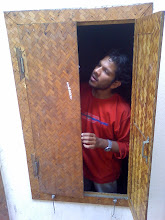“There’s a wee little bit of badminton in everything.” he observed sagely, twirling that expensive looking racquet in his hand, watching the game in progress “And a wee little bit in everyone too”. She didn’t seem to be paying attention, because such insight should ideally have incited violence. “It’s a game of lessons.” he went on, now calmly tossing that racquet from one hand to the other. “And I’ve heard it’s a whole lot more bearable if you try to shut the fuck up.” she finally offered. Anybody else would have taken the hint, but he was purposefully impervious to sarcasm.
“Arey, wah, sarcasm? But you’ll probably have to try a lot harder, nahin?” his smile did little but to bring him only closer to getting a kick in the shins. She had nearly perfected that move, a swift kick to the shins, or a sharp pinch between the shoulders. The kicks hurt a lot more than he might have anticipated, and the pinches a lot less than she would have preferred. “See, now, badminton is about banter too. Every retort begets another.” he said, just as a careless volley is smashed into the court. “Yeah, but sometimes that happens too.” she said, and kicked him in the shins.
While he hopped about for what couldn’t all have been mock pain, she picked up his racquet and went on ahead to join the next game. With nobody to drive up the wall anymore, he sat down to watch her play. He couldn’t have expected her to be as good as she turned out to be. Brilliant, he thought, though if her forehand were any more peculiar, she should just have to be left-handed. A push is played close to the net, and she had to sprint across the court’s length and breadth in an insane diagonal of zigs and zags to make the lift that just couldn’t really have been lifted.
Wah, he said to himself inside his head. “Crap!” he said out aloud in a staged whisper. She might not have really intended to, though one can never quite be sure to fathom the machinations of the female brain, but somehow her next return turned quite perpendicularly; the shuttle rushed at him upwards of hundred klicks to the hour and whacked him in the face surer than a slap. Usually the shuttles don’t tend to mostly hurt very much, but he certainly seemed to be struggling to keep his face straight. “Sorry!” she manages to mention most unconvincingly as her partner scurried over to fetch the projectile.
Possibly concerned for his own wellbeing, he walked around to the other end of the court, paying his attentions instead to her opponents now. About to lose that game rather comprehensively, she must have decided to fight back; the shuttle should’ve been groaning from the sudden onslaught by the end of the next serve, and her opponents didn’t quite appear to be entirely pleased with the possibility of having to play faster, harder, and altogether better than they already were. Not that they were contesting for anything quite tangible - but a friendly is never really a friendly.
3-7. She looked at her partner, silently despairing for a miracle. And yet the serve breaks instead. Now she looked like she just wanted to punch her partner. She served. Serve breaks and changes. If she was disappointed, she wasn’t doing a darned splendid job of not being very visual about it. 7-3. Some peculiarly graphic expletives thrown towards no particular direction, so 8-3. Then 9-3. Not many moments later, Game-3. She looked at the shuttle during it’s descent, swung suddenly, missed it quite completely, and brought his racquet crashing down. He watched the racquet introduce itself to the ground with a sickening crunch that couldn't be confused for a cordial greeting, and with due respect to the fundamentals of physics, respond to the cold-concrete's interaction by very effectively crumpling into itself. He smiled weakly, his shins didn't seem to be hurting so much anymore anyhow.
By:
Sarthak Prakash




